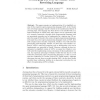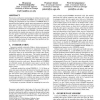ATAL
2006
Springer
14 years 4 months ago
2006
Springer
Conventional information fusion architectures are challenged by developments in sensor networks that allow individually-owned (and thereby selfish) sensors to interact and share d...
ATAL
2006
Springer
14 years 4 months ago
2006
Springer
As users interact with an increasing array of personal computing devices, maintaining consistency of data across those devices becomes significantly more difficult. Typical soluti...
ATAL
2006
Springer
14 years 4 months ago
2006
Springer
Modularization is widely recognized as a central issue in software engineering. In this paper we address the issue of modularization in cognitive agent programming languages. We d...
ATAL
2006
Springer
14 years 4 months ago
2006
Springer
Abstract. This paper presents an implementation of (a simplified version of) the cognitive agent programming language 3APL in the Maude term rewriting language. Maude is based on t...
ATAL
2006
Springer
14 years 4 months ago
2006
Springer
We present a method for transforming the infinite interactive state space of interactive POMDPs (I-POMDPs) into a finite one, thereby enabling the computation of exact solutions. ...
ATAL
2006
Springer
14 years 4 months ago
2006
Springer
A novel control mechanism was recently introduced based on Extended Markov Tracking (EMT) [9, 10]. In this paper, we present a study of its response to multiple interacting contro...
ATAL
2006
Springer
14 years 4 months ago
2006
Springer
ATAL
2006
Springer
14 years 4 months ago
2006
Springer
We apply an adapted version of Particle Swarm Optimization to distributed unsupervised robotic learning in groups of robots with only local information. The performance of the lea...
ATAL
2006
Springer
14 years 4 months ago
2006
Springer
We consider PAC learning of simple cooperative games, in which the coalitions are partitioned into "winning" and "losing" coalitions. We analyze the complexity...
ATAL
2006
Springer
14 years 4 months ago
2006
Springer
It is self-evident that in numerous Multiagent settings, selfish agents stand to benefit from cooperating by forming coalitions. Nevertheless, negotiating a stable distribution of...


